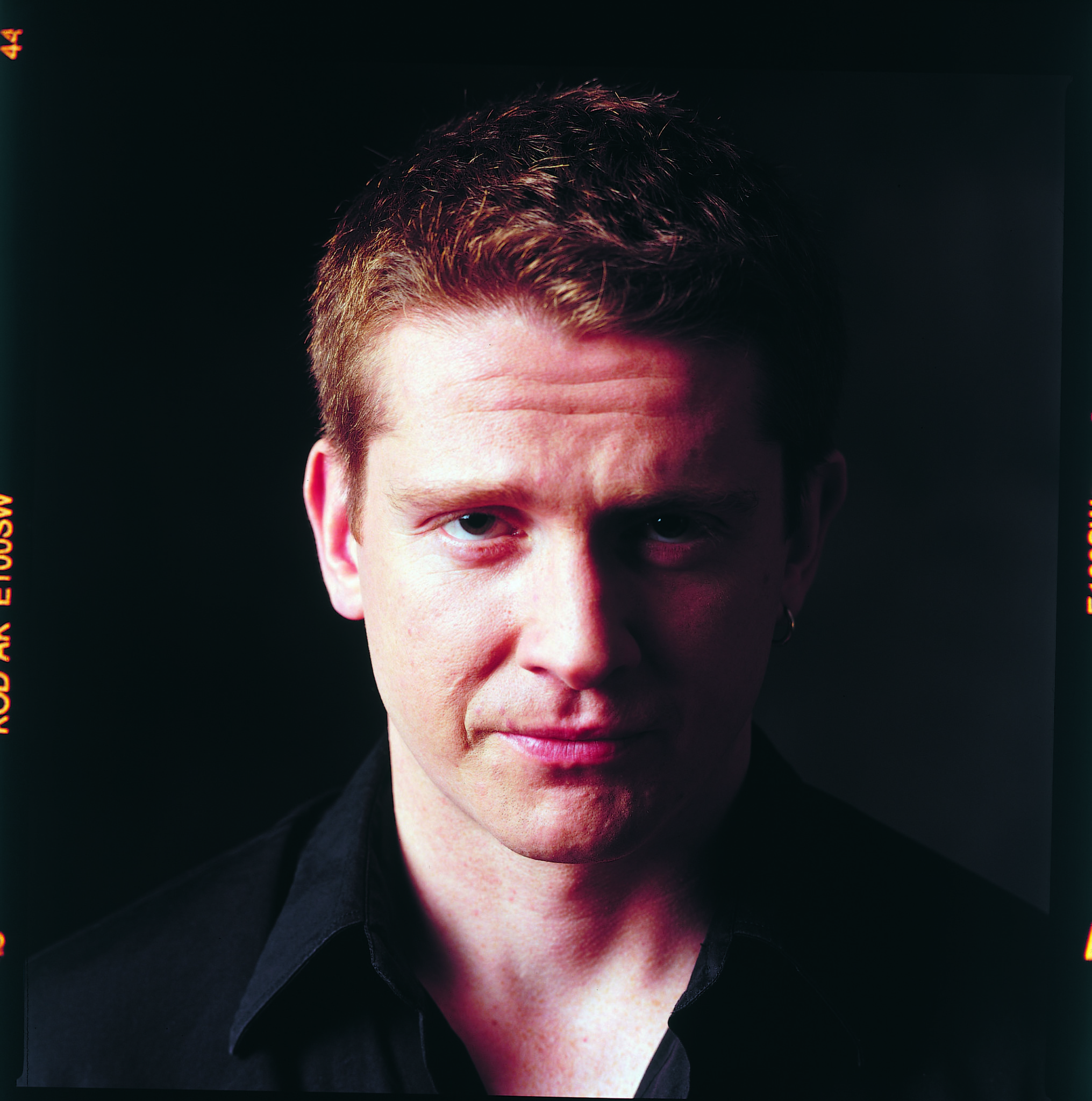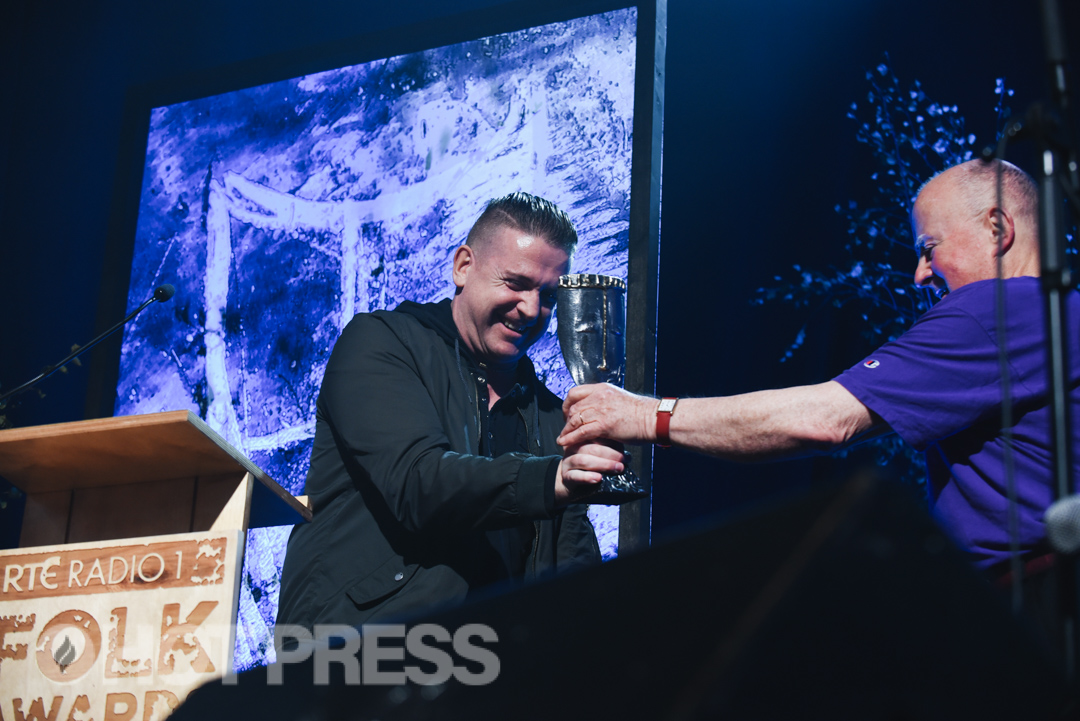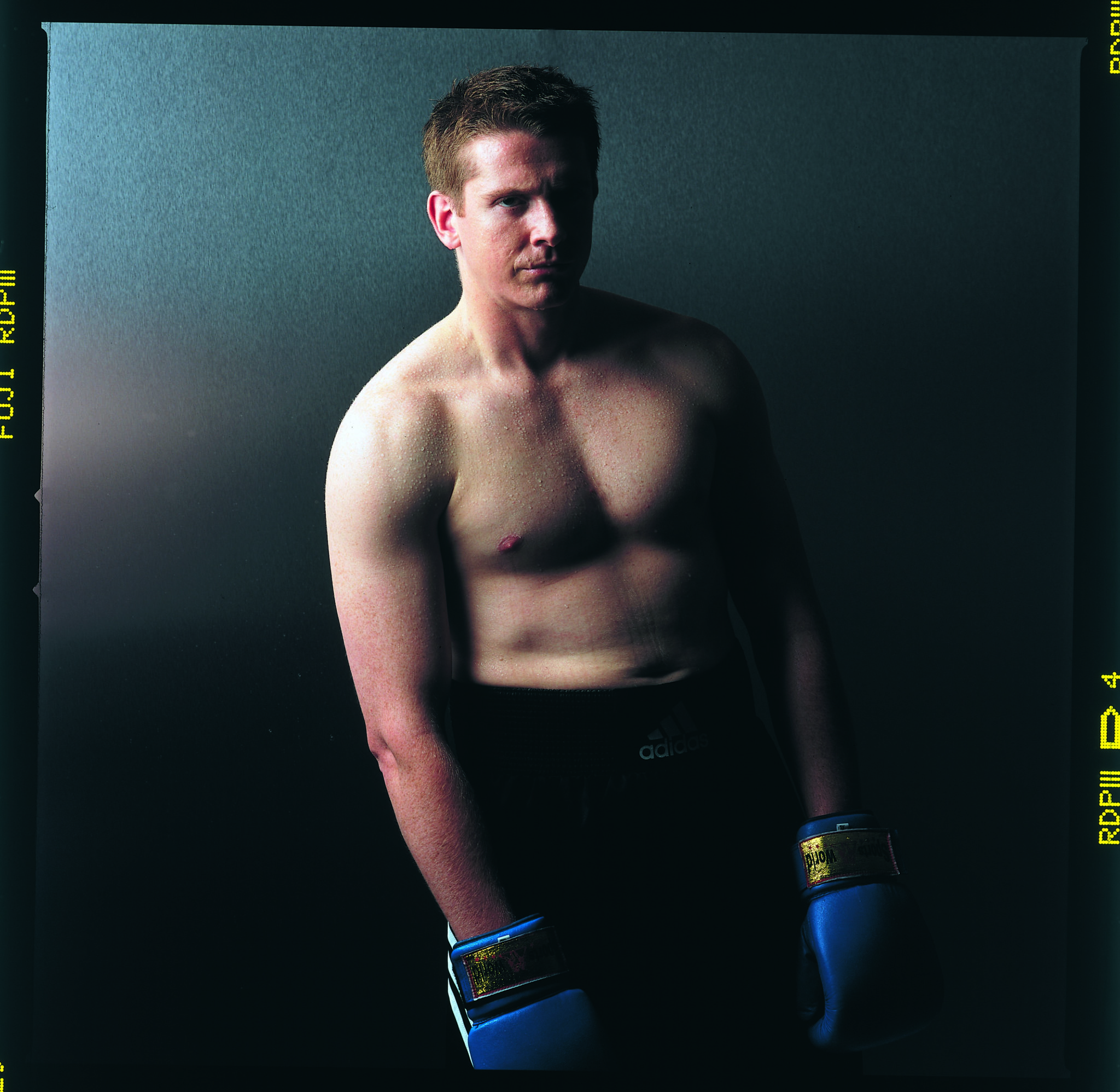- Music
- 16 May 23

On this day 20 years ago, Damien Dempsey released his seminal album, Seize The Day – described by Hot Press at the time as "a modern Irish classic." Earlier today, we revisited our original review of the album – and now we're looking back at a 2003 interview with the legendary Dublin singer-songwriter...
Originally published in Hot Press in 2003, shortly after the release of Seize The Day...
A few weeks before Damien Dempsey’s Seize The Day stormed the barricades of the Irish top ten, the man affectionately known to his fans as Damo reflected: “I’ve got a good feeling about this one. I’ve a great team around me and the right people selling it and promoting it. It all seems to be clicking into place. I think my day has finally come. I’ve finally landed on my feet now after ten years out in the wilderness.”
Upon hearing the news of a number 5 chart placing, a glowing Damo adds: “It’s going well, isn’t it? I’m chuffed and over the moon. The PR company Friction, my own management and Sony have all been working very hard for me. To see it pay off is brilliant. A couple of years ago I was seriously considering giving it up and doing some labouring. Then a few years later my album is number 5 in the charts.”
Damien has hard earned every shred of his current success, relentlessly struggling away for years.
“It’s been tough alright, but I’ve been doing what I love all along,” he muses. “It’s been tough financially. You don’t have a pot to piss in most of the time. People are telling you to get a real job and stop being a bleedin’ loser. Hopefully I’m proving them wrong now.”
Advertisement
Dempsey who turns 28 this June, first got the songwriting itch in his early teens, observing a very different Dublin city to the cosmopolitan capital it claims to be now.

Credit: Peter Rowen
“I started writing in the ’80s,” Dempsey begins. “Dark old years they were. There was a lot of unemployment on my street and I remember a lot of joyriding. They were rough days. I’d be going to my grandmother’s house in Cabra West and there’d always be gangs of men standing on corners.
“The smog was really bad so the first thing I wrote about was that,” he reveals. “It was a song called ‘Smog’. That was the first thing I ever wrote. I started writing lyrics a lot. They were bad years because Phil Lynott died, Luke Kelly died, Bob Marley died and John Lennon died all around the same time. All these people meant a lot to me and I played their music more and more after they died. I think it was when I heard Philo’s stuff, when Dublin was mourning him, that’s when I got a guitar. I took to it like a fish to water. I took a few lessons along the way but mostly I learnt everything myself.”
A little breakthrough came along in the shape of a yoghurt-sponsored music competition.
“I was encouraged to enter the Yoplait Song Contest with a song called ‘Cardboard City’, so I suppose even then I was socially conscious,” he laughs. “I was into that. Philo did songs about children being neglected in South America and Africa and I adored Bob Marley, still do. Lennon and Christy Moore, Sinéad O’Connor in the eighties – all these things. Good protest songs. I admired people who took a stand and said what they weren’t happy about in the world. I liked to be blunt, not to sugar coat things, and wear my heart on my sleeve. I came second in the contest when I was seventeen. I won a big ghetto blaster and played live on 2FM. That’s when I thought there might be something in all this for me so I stuck to it.”
Advertisement
It wasn’t all accolades and roses though.
“When I was 19 I did a thing for the Beat On The Street in Tallaght, Cork, Ennis and Tralee,” Damo continues. “I needed six months of bleeding therapy after it. First of all, I was sandwiched in between two boy bands. The mike wasn’t set up for live vocal. So if I set one up, the boy bands would kick up stink over it. I had to go on and mime to a CD that skipped. I was standing there like an embarrassed goldfish. It was one of the most embarrassing things in my life and to make matters worse I had to walk through the crowd to get out of there. Some young one recognised me and goes, “Howya Skippy!” She might have been referring to the fact that the CD was skipping or else that I was jumping around trying to dodge missiles all through the gig like a bleedin’ kangaroo.”
The days of innocence, free stereos from dairy product companies and Beat On The Street fiascos were soon left behind. “In the late ’80s things changed a lot,” Damien recalls. “Drugs came along. Smoking pot, doing acid and listening to Jimi Hendrix trying to play the solos. Then rave exploded so I got into that. I was like a sponge for all these things. Then the Celtic Tiger came along and really changed Ireland. Obviously, there was good and bad points to it. I think resources could have been used a lot better for housing and healthcare. Nobody was building authority houses for people and the cost went up tenfold.
“The average wage might have gone up, but not enough. There was a lot more work but most of it was multinationals with people on assembly lines on night shifts and not allowed to have a union. Then after ten years they pack up and go off somewhere with cheaper labour. That’s going to happen more and more from now on. Lots of houses will be re-possessed because people can’t afford the mortgage payments.”
“It changed the face of the place as well in some very weird ways,” he continues. “I saw a baby in a pram the other day with a mobile phone! I think she was on to the crèche to tell them she was going to be late! And then you’ve got consumption of alcohol. It’s gone through the bleedin’ roof! I was in Dunne’s Stores the night before Good Friday. You’d think it was a scene from before World War 3, trollies full of tins just to get through one day. As the shutters are coming down people are doing Indiana Jones style rolls underneath to get the last few gargles.”
After plugging away and banging his head against every brick wall in town, Damo felt the allure of brighter lights and bigger cities.
Advertisement
“I wasn’t doing well here and not getting much respect,” he remarks. “Not many people were coming to the gigs and I felt stuck. I was going around in circles and not making any money and struggling. I thought, ‘Feck it! I’ll go to New York.’ A friend of mine had a bar and he offered me a few gigs in this basement in Brooklyn, so I played there and worked behind the bar.
“It was good to get out for a while and be in a different mindset for writing. But most of the songs I wrote were actually about Ireland. But that’s the way it goes. Joyce went to Switzerland and all he could write about was Dublin. You can see it more for what it is when you leave. I got a sense of self over there. I was meeting all sorts of people – Afro-Americans, Jewish Americans – whatever. It opened my mind a lot. All these people, cultures and languages all there on one small island! Then I came back here and saw all the refugees and immigrants coming in. I thought it was brilliant! They bring colour and diversity to the place.”
A chance encounter with Shane MacGowan unearthed a new vein of support and encourage-ment from many of Damo’s Irish heroes.
“I met Shane through a friend of mine Chris Byrne who was a piper and rapper in Black 47 and used to be a copper with the NYPD,” he explains. “He put my first CD on the jukebox in his bar in New York (They Don’t Teach That Shit At School) and MacGowan was in town. He was listening to it and loved the song ‘Colony’.
“I didn’t know about this, but then I went to meet Shane after a gig and gave him a CD, thinking nothing of it. I thought he’d lose it! So I shook his hand and walked towards the door. Then he shouts ‘Brother! ‘Colony’! I love that song! Come back here!’ So I went on the gargle with him and woke up on the floor of Eamonn Doran’s with a hoover bopping off my head. So that was my first experience with Shane. Over the next few months, I hung out with him a bit and did a few supports. I was amazed by the intelligence of the man and had great craic with him as well. He gave me great encouragement and advice.”
Encouragement and advice also came from another legendary source – the great Christy Moore.
Advertisement
“Christy was always a huge idol of mine,” Dempsey affirms. “I probably respect him more than anyone else in music for the way he stood up for things. I’m nowhere near as confrontational as Christy was but to a certain extent I am. I met him in the International Bar and he took my number. He called me up and gave me some supports. He gave me a gig in the Point after a bad period in my life. I was hitting the gargle heavy and raving and all that. I got into a row and got a bit of a kicking outside a chipper. Christy heard about that and called me up saying, ‘I’m doing the Point Depot and I want you to get up there and do a few songs’. So I put on my brown trousers and went down to the Point.
“I was nearly about to go and walk out under a car that day as I was so nervous and I just wanted to get knocked down so I wouldn’t have to do it. I was desperately looking for a way out of doing the gig. I was terrified. But I did it and it was the best thing I could have done. Christy gave me great advice. So did Sinéad. It’s great to have that and amazing to have these heroes that appreciate me and what I do. I’m very, very lucky.”

Damien Dempsey and Christy Moore at the RTE Folk Awards 2021. Copyright Miguel Ruiz.
When Sinéad O’Connor heard Damien’s music, she too was blown away.
“I did a tour with the Hothouse Flowers in England,” says Damo. “When Liam O Maonlaoi first asked me to come on tour with them I thought he wanted me just to do security to keep the women off him! That would have been deadly all the same, but he wanted me to open up for them. I went to a party one night after playing the Shepherd’s Bush Empire with Bronagh Gallagher and met a fella called John Reynolds, a good friend of Sinéad’s and the Flowers. He was lovely. A real big fella that used to do plumbing and work on sites. Really into Martial arts and a black belt. He came along the next night and asked for a CD. I didn’t think anything more of it and went home to Dublin.
“But then, he got Bronagh to send him over the CD and he sent it on to Sinéad. She was doing a bit of work with Massive Attack at the time and wanted to record ‘It’s All Good’. They recorded it and I was thrilled. I told half of Dublin about it and then they didn’t use it which was a bit of a slap in the face. But that’s how I got to know Sinéad. She liked where I was coming from. I loved the way she came out and became a priest. I always felt women should be priests and should be allowed to get married and have as much sex and children as they wanted. People would come back in flocks. Bring music back. Good trad music. Make it more spiritual and linked to the earth. Mix in the Celtic with the Christian.”
Advertisement
It was Samuel Beckett who perceptively noted: “The British Empire and the Holy Roman Catholic Church – they buggered us into existence.”
“I think a lot of drug and alcohol abuse comes from the years of oppression from colonialism and the Catholic Church,” Damo concurs. “There is a historical cycle of abuse. Mothers and fathers beating their children because they were beaten before. It’s also a verbally abusive society. Don’t mind what anyone says about you. It’s what you are that counts. You’ve got to love yourself. I try to give out positive messages.”
Seldom are lyrics as positive, empowering and straight up no bullshit as Dempsey’s, “I’m never going to let / Your negative vibes and comments get through to my psyche and cripple me.” The astonishing thing about his writing is how unique it is in the current landscape of Irish music. Where are our other protest singers? Why does only a frighteningly small percentage of artistry across the creative spectrum engage with the current state of this nation? This world seems to be getting tenser and more frightening by the day – why the deafening silence?
“I think it’s tough to write about these things,” Dempsey responds. “It definitely can affect your commercial potential if you talk about all this. You’re put in the political songwriter box. Also, with the boom people didn’t really want to hear about that sort of thing. It’s hard to write about Ireland and the things going on. We often sing in an Americanised and Anglicised way as well. You can’t blame people for wanting to be universal. They see Ireland as a small and insular place which they want to get out of rather than get bogged down in what’s going on.”
However, there is growing evidence of more positive vibes. It would be a gross exaggeration to say that all the people of Ireland couldn’t give a fiddlers. We saw the polar opposite on the streets of Dublin on February 15 last, a slight turning of the tide rather than a total sea change, maybe, but somewhat heartening all the same.
“There is a change in the air and music is mirroring that,” Damo agrees. “It’s coming back to good singer songwriters. You see Other Voices on the shelves in megastores and in the top ten. The pop thing is beginning to fizzle out a bit and good music is blossoming. It was great to see all those people out marching against war. I don’t think that would have happened five years ago. But of course, the present (US) administration is the devil incarnate. It depresses me thinking about it. I have a song in the pipeline – the oil pipeline! – which will hopefully open people’s eyes a little more. That Stupid White Men book was great. We need more of that.”
Advertisement

Credit: Peter Rowen
Armed with positivity and the truth, Damo is bringing his outstanding live show all around the country. Anyone who was at the recent Village gig or any show in Whelan’s in the last two years will appreciate what a special occasion a Dempsey performance is.
“It lifts my heart,” says the man himself. “All the singing and good vibes in the room. It’s like an ancient, primal thing that you get through music. People forget what’s happening in their own lives and start singing. It’s better than any drugs. Any of the Whelan’s ones have been classic. I’ve had some great ones in the Lobby in Cork as well. Now I’m playing places I’ve never played before like Waterford and Limerick and that’s brilliant. I’ll hope I’ll show ‘em a good night. I hope the voice holds out and I hope I can take it handy on the gargle.
“My dream is to do gigs all over the country and people come along and they know every song off the album. That to me is heaven. Because if people come along and they haven’t heard me, they go ‘What the fuck? What’s gone wrong with yer man? Is he on day release?!' I think it takes three or four listens to click, to get past the delivery and get their heads around the rap, rhythm, reggae, sean nós, blues and whatever else is in there.”
And as the Damo song goes, it’s all good.
Advertisement
Read our original album review of Seize The Day here.
Watch Damien Dempsey revisiting Seize The Day as part of Hot Press' Up Close & Personal series below:
The limited edition vinyl pressing of Seize The Day is available now here.
Damien's upcoming Irish shows include two nights at the Iveagh Gardens in Dublin (July 7 & 8).










